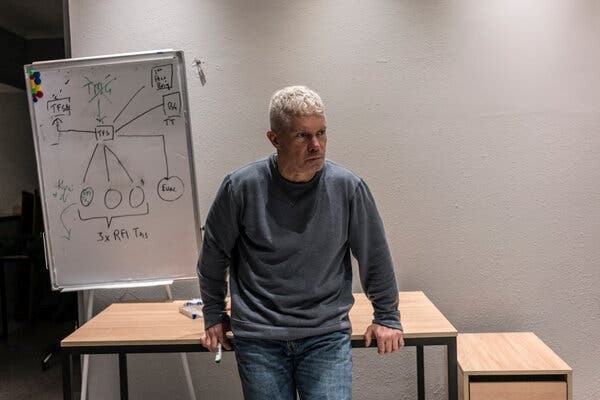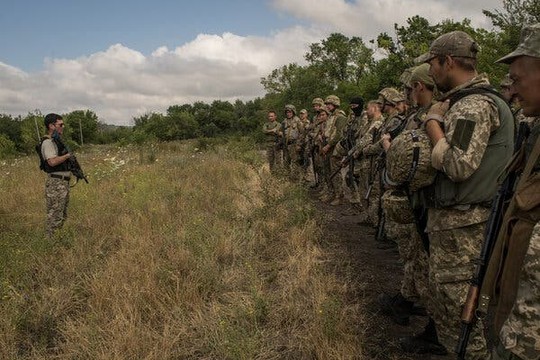Rob, left, a member of the Mozart Group, training Ukrainian soldiers.
Photo ‘The New York Times’
The Mozart Group, one of the most prominent, private American military organizations in Ukraine, has collapsed under a cloud of accusations ranging from financial improprieties to alcohol-addled misjudgments, writes Jeffrey Gettleman at ‘The New York Times’.
Its struggles provide a revealing window into the world of foreign volunteer groups that have flocked to Ukraine with noble intentions only to be tripped up by the stresses of managing a complicated enterprise in a war zone. The Mozart Group was training Ukrainian soldiers and evacuating frontline residents until the money ran out. Its collapse sheds light on the stresses faced by such groups.
Jeffrey Gettleman writes: “Andrew Milburn, a former American Marine colonel and leader of the Mozart Group, stood in a chilly meeting room on the second floor of an apartment building in Kyiv about to deliver some bad news. In front of him sat half a dozen men who had traveled to Ukraine on their own dime to work for him.
“Guys, I’m gutted,” he said. “The Mozart Group is dead.”
The men stared back at him with blank faces.
One asked as he walked toward the door, “What should I do with my helmet?”
“I’ve seen this happen many times,” said one of Mozart’s veteran trainers, who, like many others, spoke only anonymously out of concerns that the Russians might target him. “You got to run these groups like a business. We didn’t do that.”
Hundreds if not thousands of foreign veterans and volunteers have passed through Ukraine. Many of them, like Mr. Milburn and his group, are hard-living men who have spent their adult lives steeped in violence, solo fliers trying to work together in a very dangerous environment without a lot of structure or rules.”
 Andrew Milburn after a meeting, when he said the Mozart Group, which he co-founded, “is dead.” At the top of the white board, he drew an X through the group’s initials, TMG.
Andrew Milburn after a meeting, when he said the Mozart Group, which he co-founded, “is dead.” At the top of the white board, he drew an X through the group’s initials, TMG.
Photo ‘The New York Times’
“After months struggling to hold itself together, Mozart was plagued by defections, infighting, a break-in at its office headquarters and a lawsuit filed by the company’s chief financial officer, Andrew Bain, seeking the ouster of Mr. Milburn.
The lawsuit, filed in Wyoming, where Mozart is registered as a limited liability company, is a litany of petty and serious allegations, accusing Mr. Milburn among other things of making derogatory comments about Ukraine’s leadership while “significantly intoxicated,” letting his dog urinate in a borrowed apartment and “diverting company funds” and other financial malfeasance.
When Mr. Milburn showed up in Ukraine in early March last year, the capital, Kyiv, was seemingly on the precipice. Russian forces were blasting their way in from the suburbs and Ukraine was rushing thousands of inexperienced soldiers to the front.
That’s when, through a mutual friend, Mr. Milburn, 59, met Mr. Bain, 58. Also a former Marine colonel, Mr. Bain had been working in media and marketing in Ukraine for more than 30 years. Mr. Milburn, whose career has tracked America’s wars of the past three decades, from Somalia to Iraq, had both the combat experience and the contacts. He counts Marine heavyweights like the author Bing West and a former defense secretary, Gen. James Mattis, as friends.
Mr. Bain had the organization. For eight years, since Russia invaded eastern Ukraine in 2014, he had been running the Ukrainian Freedom Fund, a charity he set up that turned donations into desperately needed gear for the Ukrainian military.
The two founded Mozart, the name a saucy response to the Russian mercenary force that uses the name of another famous composer, the Wagner Group. They also ran a short-lived podcast called “Two Marines in Kyiv.”
With the Ukrainian military desperate for all the Western support it could get, Mozart quickly expanded from a handful of combat vets to more than 50 employees from a dozen countries. The group’s two specialties became last-chance extractions of civilians trapped on the front lines, which was extremely dangerous work, and condensed military training.
As spring passed to summer, more Ukrainian military units asked Mozart for training. But the Ukrainians could not pay for it, leaving Mozart reliant on a small pool of steady donors, including a group of East Coast financiers with Jewish-Ukrainian roots and a Texas tycoon.
Everyone involved said it became stressful just making payroll. And several employees said that the way the money flowed into the organization, which was overseen by Mr. Bain, was opaque.
On top of that, the people Mozart hired were not the easiest to manage. Many were grizzled combat vets who admitted to struggling with PTSD and heavy drinking. When they weren’t working, they gravitated to Kyiv’s strip clubs, bars and online dating. “There was a lot of cursing, a lot of womanizing, a lot of things you wouldn’t want to take to mass,” said another trainer, Rob.
In September, they lost an important funding stream when a charity called Allied Extract decided to use less expensive Ukrainian teams to rescue civilians.
Not long after that, a clip of Mr. Milburn disparaging Ukraine’s leadership circulated widely on social media. “I happen to have a Ukraine flag tied to my bag, but I’m not, ‘Oh my God, Ukraine is so awesome,’” he said. “I understand that there are plenty of screwed-up people running Ukraine.” The clip was taken from The Team House podcast, in which guests are invited into a living room setting to drink hard liquor with the hosts.
Mr. Milburn has rented a new office in Kyiv and says he is determined to resurrect the operation. But he’s not going back to the front anytime soon.
Wearing a gray sweatshirt, black sweatpants and running shoes, he spent hours this week in front of his laptop. He’s scouting out new business, such as training courses for hostile environments. He’s writing emails to donors.”
read more in our Telegram-channel https://t.me/The_International_Affairs

 10:38 05.02.2023 •
10:38 05.02.2023 •























